A tooth infection, medically known as a dental abscess, can be a painful and potentially life-threatening condition if left untreated. Many people underestimate the seriousness of dental infections, not realizing the significant health risks involved. In this article, we’ll explore the dangers of tooth infections, the signs to watch out for, and answer the critical question: how long until a tooth infection kills you?
Table of Contents
- Understanding Tooth Infections
- Symptoms of a Tooth Infection
- The Dangers of Ignoring a Tooth Infection
- How Long Until a Tooth Infection Kills You?
- Preventing Severe Complications
- Seeking Treatment for a Tooth Infection
- When to Seek Emergency Care
- FAQs | How Long Until a Tooth Infection Kills You
- 1. What is a tooth infection?
- 2. What are the common symptoms of a tooth infection?
- 3. How can a tooth infection become life-threatening?
- 4. How long does it take for a tooth infection to become dangerous?
- 5. What should I do if I suspect I have a tooth infection?
- 6. Can I treat a tooth infection at home?
- 7. What are the risk factors for developing a tooth infection?
- 8. How can I prevent a tooth infection?
- 9. Can antibiotics alone cure a tooth infection?
- 10. What are the signs that a tooth infection is spreading?
Understanding Tooth Infections
How long until a tooth infection kills you? The soft tissue inside your tooth, called the dental pulp, houses nerves and blood vessels. When bacteria breach this inner layer, a tooth infection can develop. This invasion typically results from untreated cavities, cracked teeth, or gum disease. The bacteria multiply, leading to the formation of pus and causing inflammation and pressure, which is often felt as a severe toothache.
Symptoms of a Tooth Infection
Recognizing the symptoms of a tooth infection early on is crucial for preventing severe complications. Common symptoms include:
- Intense, throbbing pain in the affected tooth or jaw
- Sensitivity to hot or cold temperatures
- Swelling in the face or cheek
- Fever
- Difficulty swallowing or breathing
- Swollen lymph nodes under the jawline or neck area
If you experience any of these symptoms, it’s important to seek dental care immediately to prevent the infection from spreading.
A L S O R E A D
Does Almond Milk Cause Constipation? The Truth
The Dangers of Ignoring a Tooth Infection
Leaving an untreated tooth infection can result in serious health problems. The bacteria can spread from the tooth to the surrounding tissues, jawbone, and even into the bloodstream, causing a condition known as sepsis. Sepsis is a life-threatening response to infection that can result in organ failure and death if not treated promptly.
How Long Until a Tooth Infection Kills You?
How long until a tooth infection kills you? The timeline for how long it takes for a tooth infection to become fatal can vary greatly depending on several factors, including the individual’s overall health, the severity of the infection, and how quickly it spreads. However, here’s a breakdown of the typical timeline involved.:
Immediate Risk Factors
Within the first few days to a week of developing a tooth infection, the risk of the infection becoming life-threatening is generally low, especially if treatment is sought promptly. During this period, the primary symptoms will be localized to the tooth and surrounding area.
One to Two Weeks
If a tooth infection is left untreated for one to two weeks, the bacteria can begin to spread to nearby tissues. This can lead to the development of a dental abscess, characterized by swelling, pus accumulation, and severe pain. At this stage, the infection can spread to the jawbone (osteomyelitis) or into the sinus cavities, causing sinusitis.
Two to Four Weeks
After two to four weeks without treatment, the infection has a higher chance of spreading to the bloodstream, leading to sepsis. It needs immediate attention since it is a medical emergency. Symptoms of sepsis include high fever, rapid heart rate, difficulty breathing, confusion, and severe pain. If not treated quickly, sepsis can lead to septic shock, organ failure, and death.
Beyond One Month
How long until a tooth infection kills you? It is rare for a tooth infection to remain untreated for over a month, but if it does, the risk of death significantly increases. The prolonged presence of bacteria in the bloodstream can cause severe complications, including endocarditis (an infection of the heart’s inner lining), brain abscesses, and other organ infections.

Preventing Severe Complications
How long until a tooth infection kills you? To avoid the potentially fatal consequences of a tooth infection, it is essential to take preventative measures and seek prompt treatment if an infection occurs. Here are a few steps:
- Maintain Good Oral Hygiene: Brush your teeth twice a day, floss daily, and use an antiseptic mouthwash to reduce bacteria in the mouth.
- Regular Dental Checkups: Scheduling regular dental cleanings and checkups empowers your dentist to detect and address potential issues before they become serious.
- Treat Cavities Promptly: Address cavities and other dental problems as soon as they arise to prevent bacteria from causing infections.
- Avoid Tobacco: Smoking and using tobacco products can increase the risk of dental infections and other oral health problems.
Seeking Treatment for a Tooth Infection
If you suspect you have a tooth infection, it is crucial to seek professional dental care immediately. Treatment options may include:
- Antibiotics: To control and eliminate the bacterial infection.
- Drainage: The dentist may need to drain the abscess to remove pus and relieve pressure.
- Root Canal: In a root canal procedure, the dentist carefully removes the inflamed pulp tissue, disinfects the internal canals of the tooth, and fills and seals them to stop future infection.
- Tooth Extraction: In severe cases, removing the infected tooth may be necessary to prevent the spread of infection.
When to Seek Emergency Care
Certain symptoms indicate that a tooth infection has become a medical emergency. If you experience any of the following symptoms, it’s crucial to see a dentist right away.
- Difficulty breathing or swallowing
- High fever
- Severe swelling in the face or neck
- Confusion or dizziness
- Rapid heart rate
These symptoms may indicate that the infection has spread to other parts of your body, posing a significant risk to your health.
A tooth infection is not just a dental problem; it can become a serious and life-threatening condition if not treated promptly. The timeline for how long it takes for a tooth infection to kill you can vary, but the risk increases significantly after just a few weeks. By maintaining good oral hygiene, seeking regular dental care, and addressing any dental issues promptly, you can prevent tooth infections and protect your overall health. If you suspect you have a tooth infection, do not delay in seeking professional dental treatment to avoid severe complications.
FAQs | How Long Until a Tooth Infection Kills You
1. What is a tooth infection?
A dental abscess, or tooth infection, develops when bacteria invade the tooth’s inner chamber, which contains nerves and blood vessels. This can lead to pus accumulation, causing pain and swelling.
2. What are the common symptoms of a tooth infection?
Common symptoms include severe toothache, sensitivity to hot or cold, fever, swollen face or cheek, tender lymph nodes under the jaw or in the neck, and foul-tasting fluid if the abscess ruptures.
3. How can a tooth infection become life-threatening?
Untreated tooth infections can spread beyond the mouth, potentially affecting the jaw, neck, or even the brain. This can lead to severe complications like sepsis, Ludwig’s angina, or bacterial endocarditis, which can be fatal.
4. How long does it take for a tooth infection to become dangerous?
The timeline can vary depending on several factors, including the individual’s health, the severity of the infection, and how quickly it spreads. In some cases, a severe infection can become life-threatening within weeks if not treated promptly.
5. What should I do if I suspect I have a tooth infection?
Don’t delay seeking dental attention if you suspect a tooth infection. Early treatment, such as antibiotics and dental procedures like drainage or root canal, can prevent the infection from spreading and becoming more serious.
6. Can I treat a tooth infection at home?
Home remedies can provide temporary relief but cannot cure the infection. It’s crucial to see a dentist for appropriate treatment. Delaying professional dental care by self-treating a tooth infection can lead to a more severe infection.
7. What are the risk factors for developing a tooth infection?
Poor oral hygiene, untreated cavities, dental trauma, and previous dental work can increase the risk of developing a tooth infection. Chronic illnesses like diabetes can also elevate the risk.
8. How can I prevent a tooth infection?
Maintain good oral hygiene by brushing and flossing regularly, visit the dentist for routine check-ups and cleanings, and address dental issues promptly to prevent infections from developing.
9. Can antibiotics alone cure a tooth infection?
Antibiotics can help control the infection and prevent it from spreading, but they are not a permanent solution. Dental intervention, such as draining the abscess or performing a root canal, is often necessary to fully resolve the issue.
10. What are the signs that a tooth infection is spreading?
Signs that a tooth infection is spreading include increased pain and swelling, difficulty swallowing or breathing, high fever, rapid heart rate, confusion, and swelling extending to the neck or face. These symptoms require immediate medical attention.






